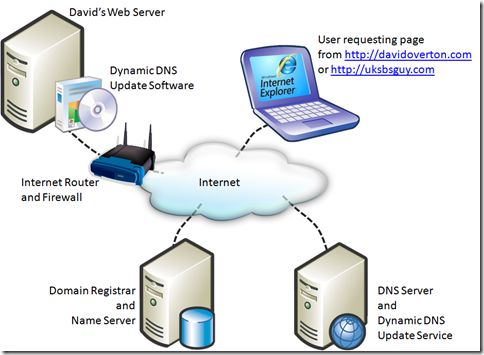how dynamic dns works
What Does Dynamic DNS Mean? |
-An explanation of how dynamic DNS works |
 |
The Domain Name System (DNS) translates Internet domain and host names to IP addresses and vice versa. When we talk about DNS, it is more about mapping the domain or host names into static IP addresses.
DDNS stands for dynamic DNS, or more specifically dynamic Domain Name System. It's a service that maps internet domain names to dynamic IP that can be changed any time. It's the DDNS service that lets you access your home computer from anywhere in the world regardless how your IP changes.
When trying to run your own web site, Email server, FTP server at home, or to connect back to your PC with Remote Desk Top, you often run into the problem to connect to your service since your IP address is dynamically assigned and can be changed any time. Once the IP got changed, the connection to your service got lost.
Unlike DNS that only works with static IP addresses, DDNS is designed to also support dynamic (changing) IP addresses, such as those assigned by a DHCP server. That makes DDNS a good fit for home networks, which normally receive dynamic public IP addresses from their internet service provider. |
How does Dynamic DNS Service Works |
To use DDNS, just sign up with a dynamic DNS provider and install their software on the host computer. The host computer is whichever computer is used as the server, be it a file server, web server, etc.
What the software does is monitors the dynamic IP address for changes. When the address changes (which it eventually will, by definition), the software contacts the DDNS service to update your account with the new IP address.
This means so long as the DDNS software is always running and can detect a change in the IP address, the DDNS name you have associated with your account will continue to direct visitors to the host server no matter how many times the IP address changes.
The reason a DDNS service is unnecessary for networks that have static IP addresses is because the domain name doesn't need to know what the IP address is after it's initially told of it the first time. This is because static addresses don't change. |
Why You Might Want a Dynamic DNS Service |
| A DDNS service is perfect if you host your own website from home, you have files you want to access no matter where you are, you like to remote into your computer when you're away, you like to manage your home network from afar, or any other similar reason. |
|
We offer free DDNS subscription servicesthat support Windows, Mac, or Linux computers.
However, something you should know about DDNS service is that you can't just choose any URL and expect to have it forwarded to your server. To have a good name to link your your server, you may want to register a domain name with us first and use it for dynamic DNS mapping.
If you don't want to spend any money, we offer free domains under linkpc.net and publicvm.com, you are welcome to use our free names for the dynamic DNS service. |
|